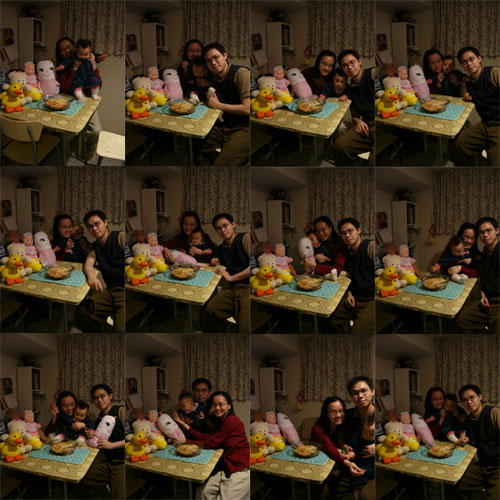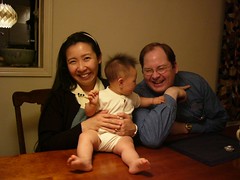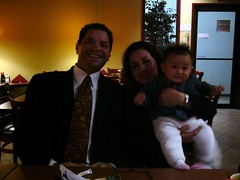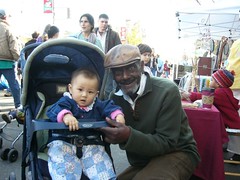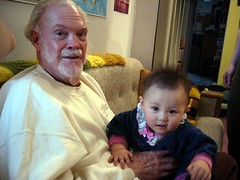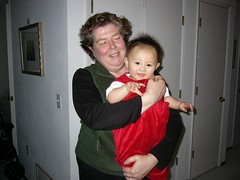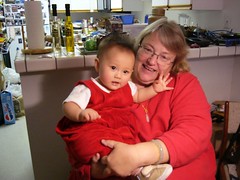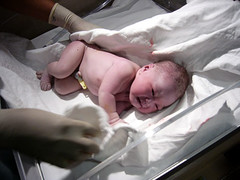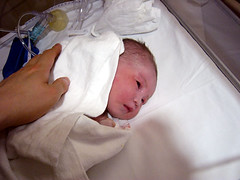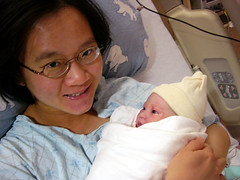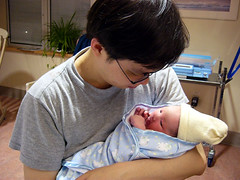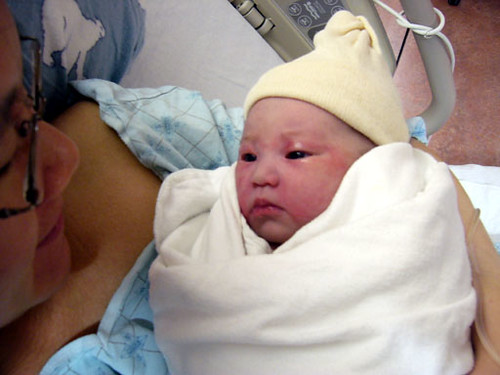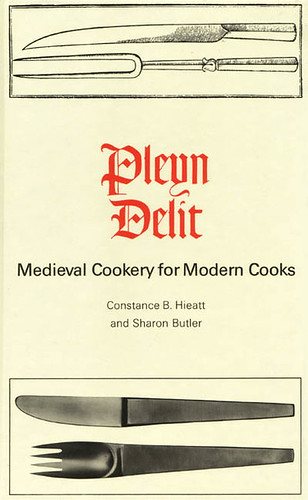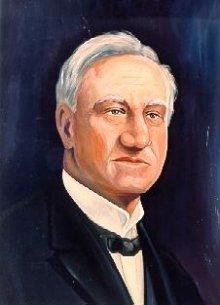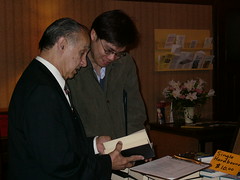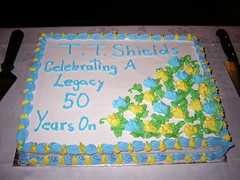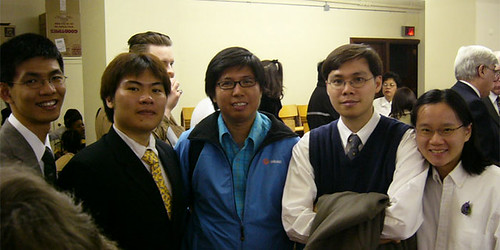Quick answer, after a little reflection: I really don't think I am!
Came across a discussion on
Sharper Iron (30 April 2005 post) that caught my attention--or rather, gave me an alarming jolt initially--because it pertains directly to some of what I have been doing on this blog: that is, post my theological views. Could I really have been in error and disobedience to God's Word when I did that? Was I presuming to be teaching men? Now, there has been, and is, much debate as to whether a woman should have pastoral (teaching, preaching) authority over men. In my mind, the Bible is clear that the woman is to be subordinate to the man, and especially in the church, in spiritual matters. That is why I do not believe it is right to have women pastors.
It is not my purpose here to really delve into this issue, or even to discuss with any great comprehensiveness the issue of "Theologicas" (my informal term--deriving from a personal joke between my husband and I--for women blogging on issues of theology). I just thought I'd share a few of my own thoughts, which will also help me to clarify for myself what it is I hope to achieve through being, at times on my blog, a "Theologica". Such discussions are valuable, and we can always pray that disagreements expressed in love and with a shared regard for God's truth as revealed in His inerrant and holy Word will be used for His glory and for the growth and edification of His children.
The discussion was kickstarted by a
post by R.C. Sproul Jr. who wrote:
A blog, for instance, could mean at least two different things. First, it could be an online journal wherein the writer simply shares the news of his or her day. I’m read plenty of blogs like that, complete with lists of how many loads of laundry were completed, and just exactly how the family car broke down. Then there are blogs that have a different purpose. The writer has an agenda beyond recording their day. They want their readers to be changed, to learn, to be sanctified. There is, in short, an important teaching element.
According to Sproul:Scope of teaching for women (Titus 2:3-6):
1. Older women teaching younger women (specific, limited audience)-- and not just women, but more specifically, women in one's own neighbourhood ("Serving your sisters in cyberspace isn’t probably what Paul had in mind, especially if you aren’t ministering to those who are, in real life, your neighbors.")
2. Content of that teaching (to love their husbands, children, to be self-controlled, pure, etc.--exclusively relating to familial relationships and the conforming of one's character to God's Word)
Thus, what's objectionable are women who appear or in fact presume to teach beyond this limited scope: those who "set out, or so it seems, to set the world straight about Auburn Avenue theology, the history of the New Testament church, that seek to change this government policy or that, that direct you to this teacher or some other." The problem isn't even that these women are teaching falsehood (though some or even many do or might); it is simply the fact that they are teaching at all. "People are teaching who shouldn’t be teaching. And people are learning where they ought not to be learning."
Because of the internet's reach to both male and female audiences worldwide, Sproul thinks that it is wrong (unbiblical) for women to post their theological views on their own blogs period. Whatever their motives, no matter their tone, regardless of whether they address their writings to younger women or no.
---
Now for some thoughts of mine:First, his bifurcation of blogs into two principal kinds: (a) online journals that are clearly largely and most obviously personal; and (b) those with "an agenda beyond recording their day" is true to some extent and ambiguous to some extent. I have no problems with his identification of category (a). But (b) appears to cover rather indiscriminately a variety of possibilities that would have been better distinguished.
Authoritative teaching is one, as in those who actually post sermons, and in the capacity of a teacher of the Word (e.g. many pastors do this). But there is also the blogger who simply wants to share, rather than teach, on theological issues. And there is a significant difference between sharing and teaching. Some might see sharing as a kind of teaching, but that's to risk blurring an important distinction and is an idea that suggests that all sharing is necessarily teaching, which obviously is not so. Consider the sharing that takes place in small group Bible study, or the interactive adult Sunday School lesson. I've attended several of such sessions in conservative Baptist churches and have never yet heard that it is improper for women to share their views on what the Bible verses say, and how they think biblical lessons can be applied to Christian living that is relevant to both genders.
Perhaps it will be countered that such sharing takes place under the leadership of a man, and is thus strictly speaking, not unbiblical. But that seems to take into account only the formal aspect (vital as it is) of the situation, not what actually takes place--for instance, the very real possibility that in a meaningful discussion male members of the group actually come to gain great spiritual insight from the sharing of female members. Wouldn't this then come under Sproul's objection about those who "ought not" to, but do, learn from those who shouldn't be teaching? [
Hubby: since one man--woman's modus ponens may turn out to be another man's modus tollens, perhaps another conclusion that could be drawn is that if Sproul wants to be consistent, he should condemn all such sharing as unbiblical as well, if he has not already done so.]
If Sproul is right, we also have to seriously wonder about the wisdom of forums like Sharper Iron where women do share on theological issues, and where their views are read by men (and hopefully not always in an inconsequential manner).
I agree with
this respondent who
clarifies that "blogging isn't (or at least shouldn't be) about exercising teaching authority," but often, more like the sharing of ideas (theological or otherwise) between laymen much in the manner C.S. Lewis characterised his own apologetic and theological writings. Writing (and publishing--being able to air one's views in a public arena) is a blessing given by God's grace, and can be used wisely for His glory. Who is to deny women, to whom God has given also intellect, emotions, and a desire to seek after Him and to understand and defend His truth, this right to do so? Must we say that Dorothy Sayers, or any other female writer whose theological ideas and books are published (on paper, or on the net) are female preachers/teachers that ought to be rebuked simply because they, by the act of publishing (making available their theological views to a potentially wide audience), are presuming to teach men?
And what about female professors in co-ed seminaries: are they necessarily restricted to teaching biblical languages and must scrupulously eschew anything that smacks of the theological? But where and how does one draw the line, anyway? Aren't our whole lives, and all that we study supposed to be guided by theological principles (and by implication a making known of what these are in a seminary context)? I know of a very conservative Reformed seminary where a women co-teaches a class of young women and men the theology of music and worship. Does this contravene Biblical teaching? I don't think so. What the Bible explicitly forbids is the exercising of teaching authority of women over men in the context of the church.
As recognised by the
abovementioned respondent, these laymen exchanges on weighty theological issues carries its own risks, "for example, the danger of plausible-sounding ideas taking hold among people who lack the training to recognise them as being, in fact, long-dismissed heresies. However, the answer to this is better catechising from our pastors, not the abolition of Christian conversation, whether online or off." Amen to that.
Second, Titus 2 does instruct older women to teach the younger women in the ways Sproul outlines. However, it does not say that the content of the teaching is to be thus limited. Surely it would be more than permissible--even commendable and in fact commanded--that women teach other women about the good news (that is, evangelise). And is not the teaching of the gospel essentially theological, and indeed at the very heart of Christian theology? And would it be wrong, on Sproul's account, for a woman to share the gospel with her male colleague if God provides an opportunity? Titus 2:3 also teaches that "older women likewise are to be reverent in their behaviour, not malicious gossips nor enslaved to much wine, teaching what is good..." Now this seems to me to include subjects that go beyond merely how a wife should love and respect her husband, etc. For one, the older women should ideally be able to understand
why Paul instructs such behaviour, and to give an answer from God's Word to younger women who ask for such reasons or who need rebuke from Scripture because they are, let's say, given to much wine?
These are just my penny's worth of thoughts on this issue. I'm looking forward to seeing how Christian conversation on this issue develops on
Sharper Iron.

